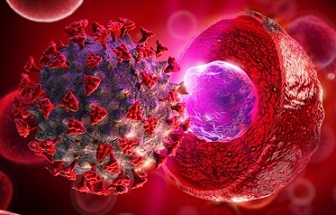BREAKING COVID-19 NEWS! SARS-CoV-2 Also Infects And Impairs Hematopoietic Stem Cells!
SARS-CoV-2 Research - Hematopoietic Stem Cells May 11, 2023 2 years, 9 months, 1 week, 5 days, 18 hours, 58 minutes ago
SARS-CoV-2 Research: Hematopoietic stem cells (HSCs) play a pivotal role in the formation and maintenance of the hematopoietic system, the body's blood cell production network. The hematopoietic system is responsible for creating erythrocytes (red blood cells), leukocytes (white blood cells), and platelets, which collectively perform a range of critical functions, including oxygen transport, clotting, and immune defense. Viral infections pose significant health risks and can disrupt the hematopoietic system, leading to hematopoietic suppression, bone marrow (BM) failure, and HSC exhaustion.

A new study involving
SARS-CoV-2 Research teams from Iran, Oman and Iraq examined the impact of viral infections, including SARS-CoV-2, on HSCs and hematopoietic stem cell transplantation (HSCT).
Hematopoietic System and Stem Cells
The hematopoietic system's primary function is to produce new blood cells that perform essential tasks, such as oxygen transport (erythrocytes), clotting (platelets), and immune defense (white blood cells, including myeloid and lymphoid cells). Hematopoietic stem cells (HSCs) are rare pluripotent cells found in bone marrow that can differentiate into various blood cell types. HSCs are crucial for repairing and restoring the hematopoietic system following infection or inflammation-induced damage. HSCs predominantly reside in a quiescent state when not actively utilized to maintain their self-renewal capacity and long-term hematopoietic system homeostasis.
Viral Infections and Hematopoietic System
Viral infections are a leading cause of morbidity and mortality in HSCT recipients, despite recent advancements in the field. The primary mechanism for preventing severe viral illness and controlling latent-reactivating viruses, such as herpesviruses, is T-cell activity, particularly cytotoxic T-cell function. Viral infections can cause BM disorders, such as aplastic anemia, pancytopenia, hemophagocytic lymph histiocytosis, lymphoproliferative disorders, and cancer. HSPCs and surrounding tissue can be directly or indirectly damaged by viral infections.
COVID-19 and Hematopoietic System
COVID-19, caused by SARS-CoV-2, is a systemic disease that significantly impacts the hematological system. Patients with severe COVID-19 often experience thrombocytopenia and blood hypercoagulability. Hematological manifestations of COVID-19 (e.g., thrombocytopenia and lymphopenia), immune response, and HSCT may be affected by the SARS-CoV-2 virus in various ways. It is crucial to determine whether exposure to viral infections can impact HSCs used for HSCT, as this may affect engraftment efficiency.
SARS-CoV-2 and Hematopoietic Stem Cells
SARS-CoV-2's impact on hematopoietic stem cells (HSCs) and hematopoietic progenitor cells (HPCs) can have significant consequences for immune responses, blood-related issues, and stem cell-based treatments like hematopoietic cell transplantation (HCT). The virus can impair blood cell production or directly affect immune cells, potentially leading to dysregulated immune responses and other blood problems.
COVID-19 patients often exhibit lymphopenia and thrombocyt
openia, indicating that the virus affects primitive and mature blood cell populations.
CD13, a possible receptor for SARS-CoV-2, is found on human bone marrow CD34+ stem cells, platelets, on HSCs and hematopoietic progenitor cells besides elsewhere in the immune system with implications that the virus can infect them directly.
Indirect effects of viral infections on HSCs and HSPCs can also have profound consequences. Cytokines and other inflammatory mediators, which are often released in response to viral infections, can impact HSC function and fate. The cytokine milieu produced during infection can alter the balance between HSC self-renewal, differentiation, and quiescence, potentially leading to long-term consequences on hematopoiesis. For example, increased levels of pro-inflammatory cytokines such as TNF-α, IL-1β, and IFN-γ can promote myeloid differentiation at the expense of lymphoid differentiation, leading to immune dysregulation and potentially contributing to the increased risk of infection and autoimmune disorders observed in patients with chronic viral infections.
Understanding the complex interplay between viral infections, HSC function, and the immune system is crucial for optimizing the management of patients with hematological disorders and those undergoing HSCT. In the context of the COVID-19 pandemic, several questions remain unanswered. For instance, it is still unclear whether SARS-CoV-2 infection has long-term effects on HSC function and engraftment efficiency in patients undergoing HSCT. Additionally, the optimal strategies for preventing and managing SARS-CoV-2 infection in HSCT recipients, including vaccination and antiviral prophylaxis, are yet to be fully defined.
Conclusions
Viral infections, including SARS-CoV-2, can have significant impacts on HSCs, the hematopoietic system, and the immune response. Understanding the specific effects of different viruses on HSC function and fate, as well as the mechanisms through which they exert these effects, is essential for improving the management of patients with hematological disorders and optimizing HSCT outcomes. Further research in this area is needed to fully elucidate the complex interactions between viral infections, HSCs, and the immune system, and to develop novel therapeutic strategies for combating the negative effects of viral infections on hematopoiesis and immune function.
The study findings were published in the peer reviewed journal: Cell Communication and Signaling. (Springer)
https://biosignaling.biomedcentral.com/articles/10.1186/s12964-023-01122-3
For the latest
SARS-CoV-2 Research, keep on logging to Thailand Medical News.
